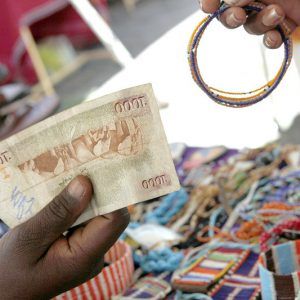It is 2022 and everyone is complaining about the rising cost of living even as wages continue to stagnate. The price of refilling a 6kg cooking gas has nearly doubled over the last three years in Kenya from Ksh 800 in 2019 to about Ksh 1500 today. The much-needed commodity is set to rise again in price to Ksh 1800 by the end of the year.
Many factors are being blamed for this steep rise in the prices of basic commodities, the latest being the ongoing Russia-Ukraine conflict that has affected energy supply chains in Europe. Although this analysis is partially true given Russia’s share in the global energy market, it still doesn’t fully explain the rising cost of living.
Prices have been going up over the decades and will continue to do so. Geopolitical conflicts like the one between Russia and Ukraine are happening on top of this trend, occasionally affecting, or being affected by it, but never causing it. The primary cause of price increases over the last few decades is the arbitrary and undemocratic manipulation of the money supply by the government. In this essay, I’ll discuss some of the major implications of this phenomenon, why it happens, and what could be done about it.
How to manufacture inflation
Although inflation in Kenya takes place for many reasons, a key contributing factor is the need for government to increase its expenditure. Take the case of an election year, like the one we currently have; government officials suddenly have increased budgets – touring the country, meeting swing voters, rushing to complete promised projects to win support, etc. How would a government increase its revenue to meet such an emergent need for resources? In theory, there are two ways a government can increase its revenue, and hence its expenditure.
The first is to increase the size of the overall economic pie maximising the number of its citizens economically who are better off; this will expand its tax base. Governments can do this via various mechanisms that include but are not limited to investing in infrastructure, education, healthcare, etc.
The second way a government can increase its revenue and expenditure is by increasing its share of the existing economic pie. The most common way of doing this is via inflation – increasing the supply of the national currency. This often takes the form of debts, where governments spend way beyond what they have, finance it with newly minted money, and push the debt for future generations to handle.
Of these two ways of raising money, the first one is harder. It is also the right way. It is long-term in nature and requires horizons that go far into the future. The second one, however, being the path of least resistance, is one that governments often default to as a means of raising their budgets. It, unfortunately, comes at the expense of real economic progress and has lots of other attendant flaws.
First, an increase in the money supply leads to a reduction in the purchasing power of money. Since money is an item whose role is only for the exchange of other goods and has no value on its own, increasing its amount will not lead to greater economic value. Instead, it will lower the value of the currency, which then manifests as increased prices. This arbitrary distortion in prices negatively affects economic decisions. Money acts as a unit of account as it sets prices. Prices in turn are the signals—the bits of information on which economic decisions are based. Therefore, manipulating the money supply distorts prices which in turn distort economic decisions.
How inflation perpetuates inequality
Besides causing random price increases that mislead economic choices, another impact of inflation that is often overlooked is the fact that it perpetuates inequality.
When central banks increase the money supply, the new units of currency are never distributed evenly to all the existing holders – it is basically impossible under this monetary system to credit everyone’s account whenever the central bank increases its ledger. To distribute the new units, central banks work with local banks to get the new units into the economy. Banks then lend out this money to individuals based on their credit history and collateral. With this view, it becomes clear how this will disproportionately favour people at the top of the economic ladder since they have better credit scores and more collateral to borrow against.
What inflation does then is to make borrowing a prerogative of the economic landscape. Meanwhile, those who are still saving up are left holding on to depreciating cash that they genuinely earned. A reduction in money’s purchasing power also leads to an unearned rise in the value of assets, most of which are owned by a small minority. The impacts of inflation on savings, assets, and lending differentially affect individuals based on their economic well-being, and this expands the economic gap.
Now that we operate under a monetary system that arbitrarily distorts market signals and inherently upholds inequality and promotes theft, what can we do about it?
I’m no expert but a good first step would be to democratize the system. In Kenya, political devolution has been lauded across political, ethnic, and regional lines because it has brought taxpayer-funded government services closer to citizens. Devolving control over the Kenyan shilling will equally bring the money behind these services closer to the citizen.
How many of our projects are funded by debt, and from who? Under this: How much is local debt, and how much is foreign? How many are funded directly by taxpayer money? When citizens can verifiably check these numbers, they’re in a better position to hold their government accountable. The monetary system we’re currently operating under makes it inherently hard for this kind of data to be shared openly, and consequently very hard to audit government expenditure. What we have ended up having are governments that act as they see fit, even if their views diametrically clash with those of taxpayers. Government thus has excessive power, particularly over the economy.
Impact of a decentralised currency
The technicalities of implementing decentralised approaches to national monetary systems are still scattered, but with the emergence of technologies that enable the execution of digital currencies, I think it is possible to partially digitise and democratise the Kenyan shilling. So what could a devolved monetary system look like in Kenya? Essentially, how can we have a currency that’s free from arbitrary government manipulation? How can we have a currency whose supply is fixed or at least one whose control over the supply is democratic? Maybe all 47 counties could have a say in the nation’s money supply. Additionally, since the monetary system is a shared resource, a substantial amount of data on its use could be shared on a public ledger that promotes accountability and transparency.
The efficacy of a nation’s economy has always been dependent on the quality of its currency, and although there is nothing wrong with printing money per se, how the money is printed matters. For example, if you print money at a rate of 10% new units per year, i.e inflation of 10% annually, you'll lower the value of a currency by half in only 7 years.
This country can take a giant leap forward if it can properly fix its monetary system. Any genuine hope of meeting Kenyans’ economic needs must start with addressing the money problem. Essentially, we want the Kenyan shilling to be resistant to arbitrary manipulation, and for its control to be democratic.
For a nation that is still recovering from post-colonial economic poverty and wracked with corruption, a democratic monetary system free from centralised government manipulation will put a hard limit on theft. Additionally, since inflation will be kept in check, savings will rise–the basis of capitalism–and this will unlock economic growth and promote development across other fields.
We have a democratic political system, why can’t we have a democratic economic system? The benefits of a superior, fair, accurate, and efficient, monetary system are ample, and we should tap into them to holistically improve the economic wellbeing of Kenyans. There exist numerous ways in which we could implement specific improvements to our money, and I hope this essay stirs deeper conversations into this crucial subject.





